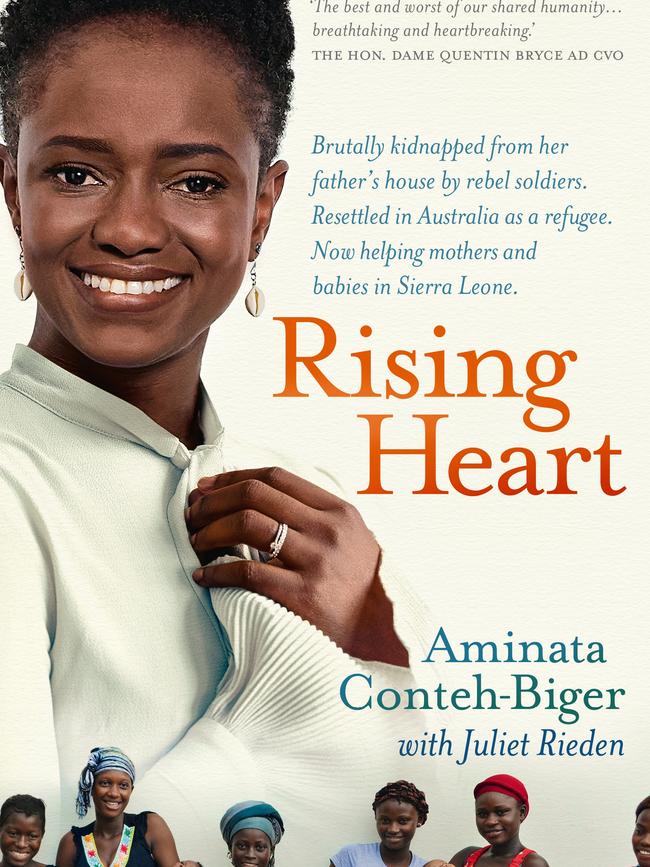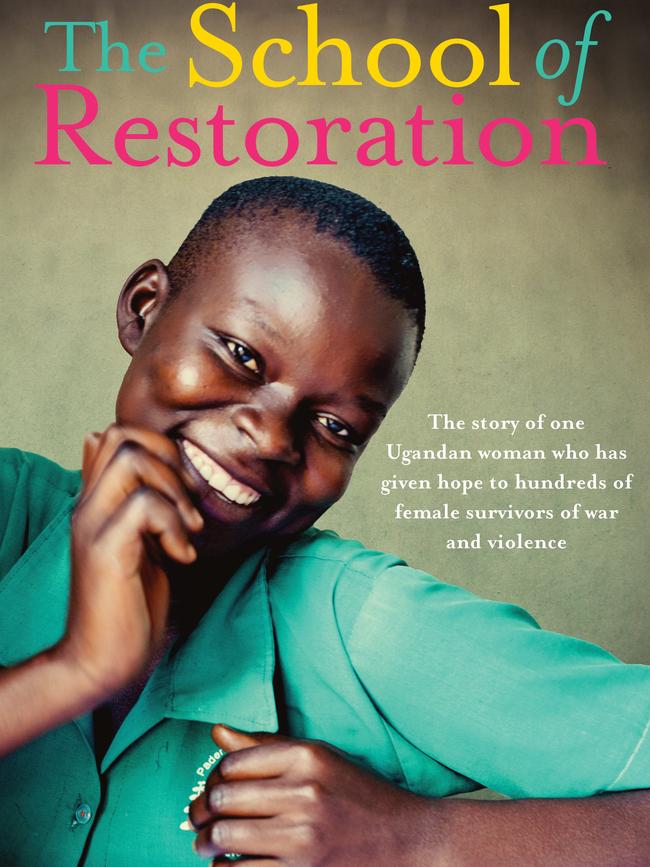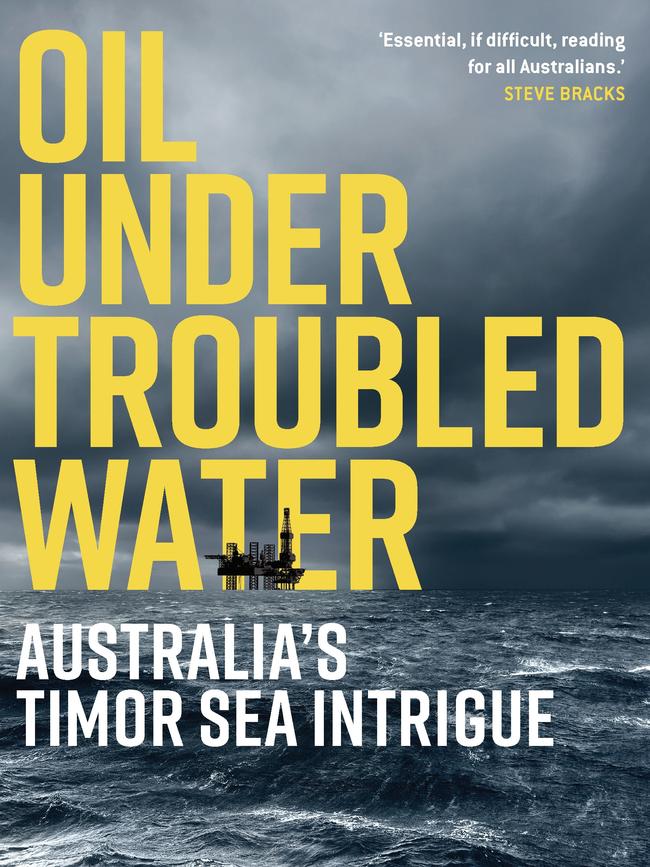Book reviews, The School of Restoration; Rising Heart; Oil Under Troubled Water: Australia’s Timor Sea Intrigue
Aminata Conteh-Biger was kept as a trophy by a cocaine-addled commander of the Revolutionary United Front during Sierra Leone’s civil war. Now she helps women through The Aminata Maternal Foundation.
As Uganda’s decades-long civil war juddered to an uneasy truce in the early-2000s, a 28-year-old social work graduate, Alice Achan, returned to Acholiland, her ravaged homeland in the country’s far north.
Every morning, she sat under the shade of an obliging tree in the district’s UNHCR refugee camp and offered to listen. It was all she had to give, the solace of shared pain.
“I returned … prepared to stand with my people,” she explains in her memoir, The School of Restoration, “to reassure them that they were not alone, and to cry with them”.
The girls who spoke to Achan had been abducted as early teens — some as young as nine or 10 — by the vicious rebels of the Lord’s Resistance Army (under the cultish leadership of war criminal Joseph Kony, 66,000 children were abducted by the LRA, forced to serve as soldiers and sex slaves).
The girls came to the tree bearing stories of inhuman abuse, many having endured pregnancies — and dangerously lonely bush births — long before their young bodies were ready; mothers to children who would forever remind them of terror.
Shamed and shunned by the community, no school would take these “girl mothers”. And so a seed was planted in that gentle patch of shade: “I was sick of being told that it was a waste of money to educate girls,” Achan writes, “and set out to prove otherwise.”
Like Achan’s confidants, 18-year-old Aminata Conteh-Biger had been dragged from her father’s arms by rebel soldiers in the last ferocious years of Sierra Leone’s civil war, and kept as a trophy by a cocaine-addled commander of the Revolutionary United Front.
The RUF’s calling card was a monstrous question: long or short sleeves? “If you answered long, they would chop off your hand; if short, they would cut above your elbow.” Freed in a televised peace negotiation, Conteh-Biger was one of the first Sierra Leonean refugees accepted by Australia.
“Writing about it now is the first time I’ve allowed myself to put it all down in words,” she notes in Rising Heart. “Most of my family still don’t know what happened to me in any detail.”

When Conteh-Biger gave birth to her first child years later, in a hermetic hospital room in Sydney in 2012, there were life-threatening complications: she was haemorrhaging, and her daughter was lodged in the birth canal. Seven doctors attended to the pair, breaking the baby’s bones to deliver her alive.
“Had I found myself in a similar situation in Africa, my daughter and I would have died,” she writes in her memoir. “The realisation was an epiphany for me … Why are we not doing something about it?”
Achan now oversees Uganda’s Pader Girls Academy, a nationally accredited school and career training facility, and a district-wide maternal health service replete with ambulance. Conteh-Biger is the founder and chief executive of The Aminata Maternal Foundation, an Australian-based charity that funds obstetric health initiatives in Sierra Leone, from family planning to fistula repairs. Plans for a hospital are brewing.
Out of the wreckage of two merciless wars come two stories of what Achan so gracefully calls “restoration in action”, hope revived by doing. Twin tales of the elemental courage — and freedom — of forgiveness, and the world-remaking power of narrative ownership, of finding the words to tell your own story.
As Conteh-Biger emphatically writes: “The time for secrets is over.”
Both memoirs begin with fathers. “He wanted his girls to feel equal to his sons,” Conteh-Biger writes of Yayah Kalfala Conteh (Pa Conteh), her merchant father, a generous and over-protective anglophile with a penchant for good manners and imported digestive biscuits.
“I had grown up with a father who loved his family and knitted us together, a father who showed us that each child was important, whether male or female,” Achan similarly describes her Baba, Otto Zedekiah, who evaded Arab slave traders as a child and worked his way up to the position of county chief “by being clever and trustworthy, rather than inheriting a title”.
Both men bucked entrenched patriarchal trends and insisted on educating their daughters. As both memoirs attest, the importance of that decision cannot be overstated. Women’s empowerment is — inescapably — a men’s issue. “How fortunate I was to have this man as my father,” Achan writes. “How he had encouraged me to keep learning when so many fathers had already arranged marriages for their teenage daughters.”
The last time Achan saw her ailing Baba, they spoke mostly of her schooling. “If I die, you are not to worry so much,” he told her. “The most important thing is education. You have to study.”
Penned in collaboration with Australian writer Philippa Tyndale, The School of Restoration traces Achan’s struggle to complete those studies, from her first lessons in a “tiny village school with two huts as classrooms and barely a pencil between us”, to founding the Pader Girls Academy.

The more Achan learns, the bigger a life she can imagine for herself; a life unfettered by old expectations: marriage, childrearing, subservience. Yet again and again “war, disease and calamity” threaten to rip her out of the classroom, to turn her into “just another Ugandan girl who desperately wants to finish school but cannot”.
Tribal raids rob her family of its livelihood; LRA rebels storm a school dormitory and abduct dozens of her classmates; one by one, AIDS claim those she loves most — years of slow, cruel disintegrations. Yet the tree is waiting for Achan, the camp full of girls with eager brains and terrible stories lodged in their throats. How she finds her way to them is a tale as intimate as it is systemic; of geo-political machinations and gender discrimination, the human weight of grief, and the “dark poison” of despondency.
“I’ve discovered that hope is more powerful than scars,” Achan writes, “and this will be my weapon. I will speak, and someone might listen, and in listening they might understand.”
“Writing this book has not been easy,” Conteh-Biger writes, “but it has been a healing process for me. Part of my head will always be back in the mountains of Sierra Leone with the rebels. But I refuse to be their captive.”
The story of those brutalising months is hers alone to tell. In the aftermath, Conteh-Biger yearns for “a fresh start in a country that didn’t know my story.” Written with the assistance of journalist Juliet Rieden, the focus of Rising Heart is how that new life was built.
With her rebel tormentor obsessively searching Freetown for her (“he really believed that what he felt for me was true love”), Aminata is granted a “Woman at Risk” humanitarian visa for Australia. When she arrives in Sydney — so sleek and “big and perfect” — it feels like stepping into “a James Bond movie”.
Conteh-Biger’s first years in Australia unfold with shameful inevitability, lonely and fraught: “I knew I was coming to a country where there was no one here that looked like me, but I didn’t understand why they didn’t like me when they didn’t even know me.”
Restaurants refuse to seat her inside, or serve her on clean plates; slurs are yelled from passing cars; a group of young blokes follow her home every night, thumping on her door and dredging up wartime terrors.
We need to face such stories, to accept that they are not aberrant but heartbreakingly endemic. And we need to respect how monumentally difficult it is to share them, for Australian refugees to break the unspoken cultural expectation of eternal indebtedness.
“I believe there isn’t a single refugee in this country who isn’t grateful …” Conteh-Biger writes, “but as a refugee, you can feel like you should always be grateful.”
It is telling that she must go to such pains to avoid our hair-trigger nationalist oversensitivities: “When you point out racist behaviour, people can be quick to assume that you are saying they are a racist person, or even that, for example, all Australians are racist. I want to be really clear about this; in no way do I mean to call all Australians racist.”
Critique is a necessary part of patriotic affection: evidence of high expectations, of hope, of investment in shared ideals; a check on the national ego.
Rising Heart is Conteh-Biger’s clear-eyed love letter to Australia, and to the network of people — from church mentors to playwrights — who helped her make it a home. It is also a love story, “pure and real and true”. Conteh-Biger’s husband, Antoine, has “never raised the idea that so many people do — and I hate — that something has been taken from me.”
While she was preparing her visa application, a canny UN official changed Conteh-Biger’s birthdate so she could enrol at a NSW high school and finish her interrupted education. Those years of structured learning provided her with the kernel of a support system, with adults who saw her, and foundational skills.
A treasured retail job followed. A chosen marriage. Two wanted children, born healthy. It’s a chain reaction of informed choices, of agency. And as Rising Heart shows, its empowering energy radiates onward, into the international charity Conteh-Biger now runs.
“Our Dad said that educating us was the property he could give us that nobody could take from us …” Conteh-Biger reflects.
“He was right.”
Read together, The School of Restoration and Rising Heart offer irrefutable and joyful proof — if more proof were at all required — that women’s education is a silver bullet; a democracy-building, community-strengthening, horizon-broadening, cultural wound healing, prosperity super-charging, revolutionary wallop. It’s not (just) a proverb, it’s a mighty truth: Educate a girl, educate a nation.
Beejay Silcox is a writer and critic. The School of Restoration by Alice Achan and Philippa Tyndale (Allen & Unwin, 292pp, $32.99); Rising Heart by Aminata Conteh-Biger with Juliet Rieden (Macmillan Australia, 292pp, $34.99).
-
Diplomacy in the spotlight
By Paul Cleary
In the past two decades, the small and impoverished half-island territory that is East Timor has pulled off not one but two incredible coups against overwhelming odds.
The first, which followed 24 years of dogged diplomacy and armed resistance, resulted in the UN-backed ballot on self-determination in 1999. But the second, perhaps less widely appreciated, was Timor’s tenacious pursuit of its rights to the resources of the Timor Sea.
This culminated in a 2018 permanent maritime boundary that followed the median line and delivered up to 80 per cent of the future revenue from the giant Greater Sunrise gas field.
One individual with a long role in both struggles is the lawyer Bernard Collaery, who more recently is better known for being charged with conspiracy to breach the Intelligence Services Act as a result of acting for the former ASIS agent known only as Witness K.

Readers of Collaery’s book, Oil Under Troubled Water, may think it will deal with the sordid details of Australia’s espionage against Timor in the oil negotiations, or reveal more about Witness K and what led him to divulge details of Australia’s infamous bugging operation in Dili in 2004 (which proved crucial in securing that 2018 boundary).
But as Collaery is forbidden from talking about the charges against him, there is scant mention of these details. Witness K is referred to briefly on just two occasions.
Given these limitations, Collaery’s approach is to use the Timor saga as a window on the conduct of Australian diplomacy in the post-World War II era.
The book demonstrates how a democratic nation that upholds the rule of law and the principle of the fair go was let down by some politicians and bureaucrats. This seems all the more galling given Timor’s stoic wartime support of Australia. The conclusion is that unlike Australia’s formidable economic and defence institutions, foreign affairs emerges as the arrogant and embarrassing uncle in the official family.
Collaery’s investigation begins in 1941 when Franklin D. Roosevelt and Winston Churchill agreed to the Atlantic Charter, an eight-point plan that foreshadowed a new world order. A key principle for colonies such as Timor was the right to “choose the form of governments under which they will live”.
But this principle didn’t fly when, in 1963, the Menzies cabinet, acting on the advice of the Department of Foreign Affairs, decided there was “no practicable alternatives to eventual Indonesian sovereignty”.
It was no coincidence that from this time onwards Australia began asserting a claim to the lion’s share of the oil-rich Timor Sea by issuing exploration permits over approximately two-thirds of the Timor Sea, rather than a half share that would have prevailed with a median line.
This action was contrary to Australia’s signing of the 1958 Convention on the Continental Shelf which stipulated that the median was the default position in these circumstances.
DFA’s desire for Indonesian control of Timor was supported when, in 1972, Australia secured a favourable maritime boundary with Indonesia that locked in the two-thirds share of the Timor Sea. DFA hoped this boundary could be extended to close the gap opposite Portuguese Timor should Indonesia assume control of the territory.
Collaery’s research shows how the defence department’s perspective was sidelined. As Gough Whitlam’s then defence minister Lance Barnard wrote, there was no case for the use of force and he was not “unduly disturbed” by the prospect of an independent Timorese state. It might have better prospects than many of Australia’s Pacific neighbours, he added.
While much of the tragic history of East Timor, including the Timor Sea imbroglio, has been well-documented, one of this book’s unique contributions is to examine how both Australia and Timor lost billions in revenue by failing to include helium gas in the definition of petroleum for the production contracts.
As such, while DFA was doing its utmost in negotiations to bully Timor out of its right to resources that would underpin its future, Australian officials allowed the multinational oil giant ConocoPhillips to pocket billions in revenue from the sale of helium, free of production taxes. Based on an unnamed US source, Collaery speculates that the tax-free helium is worth $US2.5 billion a year.
Not that this rip-off was clandestine — it involved building a helium processing plant adjacent to the LNG facility in Darwin which was opened by then resources minister Martin Ferguson in 2010.
One area of “intrigue” glossed over by Collaery was the role of Timor’s lead negotiator, former US diplomat Peter Galbraith. On one hand he credits Galbraith for securing “a vital source of revenue” from a 2002 treaty, but on the other he fails to mention that Galbraith ignored the advice of a Norwegian expert to ensure that the production contracts included helium in the definition of petroleum. Collaery does not examine Galbraith’s 2003 advice to steer negotiations away from maritime boundaries and towards a revenue-sharing arrangement for the Greater Sunrise field, which suited Australia. Nor does he examine Galbraith’s advice in 2004 to settle for a cash payment of $US4 billion rather than the 50 per cent share that was achieved.
In this extraordinary and long-running saga, perhaps there’s still more Timor Sea intrigue than what’s contained in these 400-odd pages.
Paul Cleary was a member of East Timor’s negotiating team during 2003-05 and is the author of Shakedown: Australia’s Grab for the Timor Oil. Oil Under Troubled Water: Australia’s Timor Sea Intrigue by Bernard Collaery (MUP, 466pp. $39.99).



To join the conversation, please log in. Don't have an account? Register
Join the conversation, you are commenting as Logout